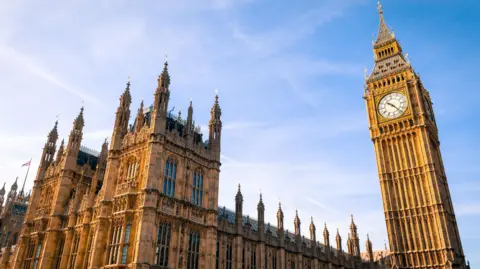MPs call for more transparency over money for Scotland
 Getty Images
Getty ImagesA Westminster committee has called for greater transparency over how the Scottish government is financed.
The Scottish Affairs Committee made the recommendation in a report having examined the effectiveness of the Barnett formula - the measure used to work out how much money the UK government sends to devolved nations each year.
The Scottish and UK governments have long-disputed whether the formula is fair since its introduction in 1978.
MPs agreed that although the mechanism was "fit for purpose" it was not perfect, and that UK ministers should be more transparent about their calculations.
The committee also said consideration should be given to increasing Scottish ministers' ability to borrow cash for infrastructure projects.
 PA Media
PA MediaThe Scottish government said the committee's report confirmed its finances are largely dictated by Westminster.
But the UK government said Scotland had received a record settlement in the recent spending review.
Patricia Ferguson, chair of the Scottish Affairs Committee, said the Barnett formula had been the subject of continued debate since its introduction almost 50 years ago.
She added: "Throughout our inquiry we've scrutinised it from every angle and ultimately found that the formula is fit for purpose and support its continued use to determine Scotland's funding levels.
"The formula is in no way perfect, but the committee heard no convincing evidence that there is any need for the formula to be reformed significantly, or that there is a workable alternative."
The Labour MP for Glasgow West said the report set out ways to improve the way it operates in practice by "improving transparency" and making changes to the Scotland's broader financial framework.
Scotland's Finance Secretary Shona Robison welcomed the findings.
She said: "This report rightly recognises that Scotland's finances remain largely dictated by the UK government's spending decisions, irrespective of the impact on Scottish public services.
"That has meant Scotland has been left with a shortfall of £400m to pay for the chancellor's national insurance increase, and saw Scotland short-changed by more than a billion pounds over the next three years at the recent Spending Review."
Robison said the decision to tax higher earners more in Scotland helped support public services and provide free tuition, prescriptions and the Scottish Child Payment.
Scottish Secretary Ian Murray said the June spending review provided the Scottish government with an extra £9.1bn.
He added that, thanks to the formula, spending per head in Scotland was around 20% higher than the rest of the UK.
Murray said: "This report confirms that it appears to be the position of the Scottish government to scrap that formula that delivers higher funding.
"They should explain why they want less money for public services in Scotland.
"Their plans for full fiscal autonomy would mean a £12bn cut in public spending for Scotland."
 EPA
EPAThe committee supported the continued use of the "imperfect" formula and recommended a series of measures to the UK government to improve its operation.
In a bid to improve transparency it called for greater clarity on how comparability percentages are calculated.
This could be addressed by publishing details of its calculations in future funding policy statements.
The committee also expressed concern about the impact of UK government spending decisions on the Scottish government's budget "often with little warning".
It said ministers in Edinburgh should have more fiscal flexibility and greater capital borrowing powers.
Currently, the Scottish government is limited to borrowing £600m for day-to-day spending and £450m for capital projects.
In written evidence to the committee, Robison reiterated support for full fiscal autonomy - an arrangement which would see powers over tax and spending devolved.
But the report described this as an "unrealistic prospect" and added there was not a compelling case that it would automatically result in higher levels of funding for Scotland.

It was meant as a temporary measure and credited to Labour Treasury minister Joel Barnett. But now aged 47, the Barnett Formula has stood the test of time.
It may be far from perfect, but it's much easier to keep it than to throw it away and start a new calculation of how much the Treasury should distribute to Holyrood, as well as the Stormont Assembly and the Senedd in Cardiff.
After another look in its engine room, MPs have concluded it's "fit for purpose", which is surely true if the purpose is to avoid a protracted political wrangle.
It can be tinkered with, and that tends to mean either a call for more flexibility - in this instance, on borrowing - or more clarity about how dollops of money are credited to the Scottish government's account.
That money comes with an expectation that Holyrood should be grateful for what it gets but without any public explanation of how the numbers have been calculated.
The Treasury may not be in a hurry to comply with MPs' wishes.
As a share of changes to spending, the "Barnett consequentials" going to devolved administration can sometimes be a tell-tale indication that distribution of funding across Whitehall departments, from which the Barnett figures should be derived, is not as generous as Treasury ministers claim.
